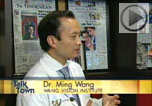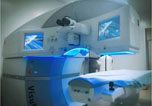- Over 55,000 LASIK and cataract procedures (including on over 4,000 doctors)
- The FIRST center in TN to offer Laser Cataract Surgery
- Introduced bladeless all-laser LASIK to the state
- Implanted the state's first FOREVER YOUNG™ Lens
- The first surgeons in the US to perform a new Intacs surgery to treat keratoconus
- Helped patients from 40 states and 55 countries
- International referral center for cataract surgery and LASIK complications
- Read Dr. Wang's book: LASIK Vision Correction
Why did you decide to have LASIK? Why did you choose Dr. Wang? How has your life changed since your LASIK procedure?
What is your advice for people considering LASIK?
Click to read more
| Article Library | Print This Page |
Primary eye care in China –an emerging field with increasing opportunities
From Ming Wang, MD, PhD
Founding president, Tennessee Chinese Chamber of Commerce (www.tccc.us)
Clinical associate professor of ophthalmology, University of Tennessee
Director, Wang Vision Cataract and LASIK Center, Nashville, TN, USA
drwang@wangvisioninstitute.com, www.WangCataractLASIK.com
2011 has ushered in a new era for China. In the past year, China has surpassed Japan to become the world’s #2 economy (second only to the U.S.), and to become the U.S.’ largest creditor. With a huge trade surplus with the U.S. (over $250 billion a year), an astoundingly rapidly growing economy, and a large population with an increasing demand for better goods and services, China has now also become the world’s largest, most exciting and attractive new market for goods and services produced from all over the world.
The unprecedented economic growth in China (double-digits in GDP annual growth for over a decade) has created extraordinary new market growth potential in every area, particularly in healthcare (such as eye care). Currently, it may surprise everyone here in the West that primary medical care, including primary eye care, does not exist in China. Due to the significant shortage of primary care physicians (including ophthalmologists), Chinese citizens have to go to hospitals for their medical care when they have illnesses, and see whichever doctors happen to be on duty. There are no long-term, one-on-one doctor-patient relationships, which is the cornerstone of Western medical care here.
This situation is rapidly changing however. With the increase in the standard of living in China, Chinese citizens are now demanding a much higher quality of healthcare, including the need for primary medical care including eye care. A year ago, the Chinese government unveiled an ambitious plan for $123 billion in funding for a new healthcare reform to provide universal healthcare to all its citizens within the next 10 years.
Currently, the level of eye care in China is far behind that of the U.S. Below are some important statistics:
• Cataracts and degenerative myopia are the most significant causes of visual disability.
• Cataracts account for 36.7% of the causes of visual impairment, degenerative myopia-32.7%, glaucoma-14.3%, and corneal opacities-6.1%.
• There is a lower incidence of retinal disease than in the West (1.4% for early AMD, and 0.1% for late AMD).
• There is a strong association between myopia and glaucoma.
• 3,000 cataract surgeries (per million per year) are performed in the U.S., but the level of cataract surgery care in China is only 10% of that of the U.S. (only 300 surgeries per million per year). Currently in China, 700,000 cataract surgeries are performed each year, with 5,000,000 cases waiting. Hence, even if starting tomorrow not a single new cataract forms, it will take 7 years for China to take care of its current cataract patients. Even for advanced cataracts (20/200 or worse best corrected vision), it will take 3 years to complete surgeries for these patients.
A wide range of opportunities to participate in the healthcare reform in China--in all areas of medicine, including eye care--is now available to people involved in healthcare here in the West, where over the last several decades many of these areas have already become well-developed and mature. Specifically, these opportunities include:
• Training and education
• Importing advanced medical technologies into China
• Systemization of medical records systems and management structures
• Establishing a medical-legal infrastructure
• Real estate development and hospital management
• Investments and joint partnerships
• Public education of eye diseases, prevention and treatment, and medical charity work
For example, over the past decade, I have been involved in the development of the Aier Eye Hospital Group--which has now become the largest private eye hospital system in China--as a co-owner of Aier and the international president of its flagship hospital, Shanghai Aier Eye Hospital. We imported and equipped all of our Aier hospitals with advanced U.S. medical technologies, and we led the way in introducing new technologies to China, such as femtosecond laser-LASIK (I performed the first such procedure in China, at our Shanghai Aier Eye Hospital in 2005). We are also among the leaders in ophthalmic training and education in China. For example, several months ago, Professor John Marshall and I led a regional teaching course for ophthalmologists at Shanghai Aier Hospital. At the September 2010 Asia Pacific Academy of Ophthalmology Congress (APAO) in Beijing, Aier had the highest number of abstracts presented (over 200), among all the hospital in China. Aier provides medical charity care for counties and provinces in the poorest areas of China, and perform over 10,000 charity cataract surgeries annually. The Aier Eye Hospital Group:
• is currently the largest private eye hospital group in China.
• has 30 free-standing, full-service private eye hospitals.
• performed 80,000 LASIK last year, which was 10% of China’s entire volume. In 2010, China surpassed the U.S. for the first time in total annual LASIK volume, with over 800,000 cases.
• performs 70,000 cataract surgeries a year, which is 5% of the entire China’s annual surgical volume (1.4 million).
• has 30 free-standing, full-service private eye hospitals.
• went IPO in October, 2009, and became the first hospital group in China’s history to do so.
In summary, China offers amazing and unparalleled opportunities in primary medical care--including primary eye care--for U.S. doctors and businesses, due to its rapid growing economy, ambitious trillion-dollar healthcare reform to provide universal healthcare to the entire national within 10 years, and its 1.4 billion population, which now has a higher standard of living than in the past and is now demanding higher quality medical care. Unlike the universal healthcare plan here in the U.S., China does have the money to pay for it, given its huge trade surplus with the rest of the world, including the U.S. At this time, however, the level of eye care in China is still significantly trailing that of the U.S., but that is precisely where and when the business and educational opportunities are the greatest. The return of investment in China these days is not measured by 10% or 20%, but by 100% or 200%. The first step to getting involved in the China Miracle is to study China and understand its culture, history and people. In the past we said “Go West, young man/woman!”, but now we probably should say “Go East, young man/woman!”
Our new texbooks
A 501c(3) charity that has helped patients from over 40 states in the US and 55 countries, with all sight restoration surgeries performed free-of-charge.




















